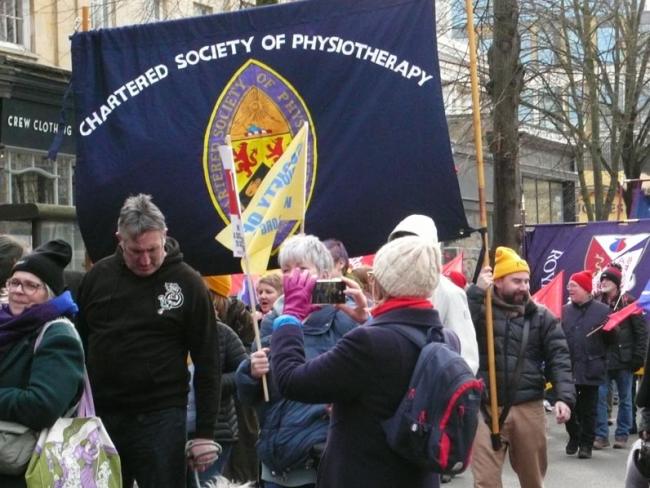
Members of the Chartered Society of Physiotherapy on the TUC demonstration in Cheltenham in January. At the TUC in September they backed a motion congratulating all unions that took action over pay restraint in the public sector. Photo Workers.
Not all unions are enchanted by the promises of the new Labour government…
Many trade union leaders and delegates at this year’s TUC Congress in September were predictably rather starry-eyed about the future following the election of a Labour government. But it wasn’t all that way.
TUC general secretary Paul Novak certainly was, opening the congress by stating, “We know Keir Starmer and this government have the interests of working people at heart…” If only…
Delegates were treated to the novelty of being addressed by a prime minister for the first time in fifteen years. Starmer’s vacuous speech to the congress referred to the now infamous “£22 billion black hole” in the country’s finances.
Mentioning all the usual problems, Starmer painted a vision of blood, sweat and tears. Congress delegates, impatient for real change, simply wouldn’t buy it.
Three of Britain’s most influential unions, Unite, GMB and RMT, persuaded Congress to adopt resolutions that rightly demand a lot more from Labour than Starmer promised, and in a rather shorter timeframe.
Investment
One resolution calls for “reforms to unnecessarily restrictive and arbitrary fiscal rules” and “a real industrial strategy” that “includes public ownership and investment and planning to help deliver strategic investment as the basis of sustainable economic growth.”
And many other unions tabled motions calling for early investment in key areas including the railways, education, the fire service and prisons.
Even more significant was the resolution that recognised the importance of steel, gas, chemicals, water and manufacturing to our prosperity, stability and national security. The resolution went on to point out that “gas remains vital to powering UK manufacturing…as well as 22 million home boilers.”
Delivering a slap in the face to energy secretary Ed Miliband, the resolution continued, “Congress notes with dismay that the new government has adopted a target to stop drilling in the North Sea before any plan for jobs has been agreed.”
It concluded with a call for “an industrial strategy policy that maximises our domestic energy strengths for national security, with all assets and options part of the solution: nuclear, renewables and oil and gas production” as well as “backing the build of Sizewell C and supporting small modular reactors.”
Congress agreed to “do everything in its power to prevent oil and gas workers becoming the miners of net zero. We will not let them suffer the equivalent of the coal closures, which broke the back of mining towns across the UK.”
A resolution from civil service union PCS and physiotherapists’ union CSP “congratulates all unions that took part in industrial action over the last two years in response to a continuous policy of pay restraint in the public sector, which has had catastrophic consequences for the living standards of public sector workers.”
It continued by pointing out that “there is some way to go to restore living standards to where they should be.”
Sooner or later that will mean disagreement with the new Chancellor of the Exchequer!
But it wasn’t all positive in Brighton. The TUC still cannot quite grasp the realities and indeed the opportunities of Brexit, with a resolution from Prospect whose sub-text was, “we want to rejoin the EU”.
A statement from the General Council on racism and the “far right” fails dismally to address the very real concerns that many trade unionists have about uncontrolled immigration.
And two resolutions on the Middle East completely failed to call for the one thing that would make a real difference – to immediately end Britain’s involvement and interference in the region.
